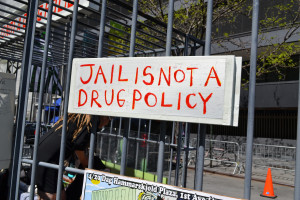

In mid-March, a United Nations body will once again issue its annual criticism of marijuana legalization in Canada, Uruguay, and several states in the United States. They will also be critical of medical marijuana laws, and of certain effective harm reduction interventions that are saving lives and preventing disease in nations around the world.
That UN entity is called the Commission on Narcotic Drugs. It's a major part of the international drug control apparatus, charged with overseeing the implementation of the international drug control conventions.
In 2009, the CND adopted a political declaration binding countries to the goal of eliminating or significantly reducing drug production, sale, and consumption within ten years. Governments should be taking a critical look at their efforts this year. They're not. The CND doesn't believe in looking back. As a result, it doesn't learn from mistakes, nor do governments like Russia, China, the Philippines, Saudi Arabia, and the United States.
Social justice and human rights activists are told to put their concerns on hold until the world is "drug free," that the ultimate human right is the right to live in a world that's free from drugs. Never mind that such a world has never existed. Never mind that it's really only some drugs, and only in some contexts. Never mind that other UN agencies like the Office of the High Commissioner for Human Rights, the Human Rights Council, and UNAIDS don't agree.
By any measure most drug control efforts focused around prohibition and law enforcement have failed badly. The people who suffer the most -- from drugs, from gangs and criminal violence, from excessive surveillance and policing, from brutal cops, from treatment that's really torture -- are the poor, the sick, minorities, and other disenfranchised communities. Sure we complain, but who cares about us? Hopefully, dear listener, the answer to that question is you.
Drug control policy is still run by people who think that law enforcement must be at its core. Most of them will say that we can't arrest our way out of the drug problem because they've learned that they have to, but they won't come up with any alternatives and they'll insist on keeping that threat of arrest and prison.
Harm reduction, decriminalization, medicalization, legalization -- all these advances and positive reforms are coming about in spite of the drug warriors. They're happening because people are organizing to make them happen.
I'm fortunate to live in a state like Oregon, which for decades has been at the forefront of harm reduction and decriminalization. There is much more that still needs doing, we have our own drug warriors to contend with, but we're well ahead of most US states.
I often wonder why that is. Maybe Oregonians just tend to be more practical than most, so naturally we embrace policies that are more effective. Maybe Oregonians just tend to be more compassionate than most, so we acknowledge the basic humanity of others including people who use drugs. Maybe it's a bit of both. It's something to think about.
- KBOO

